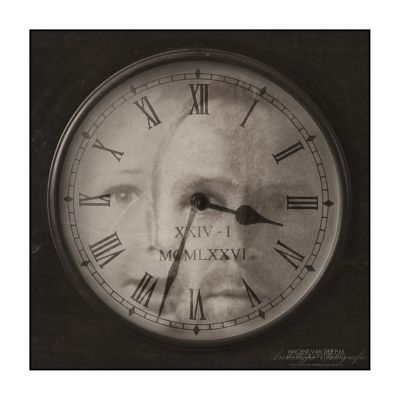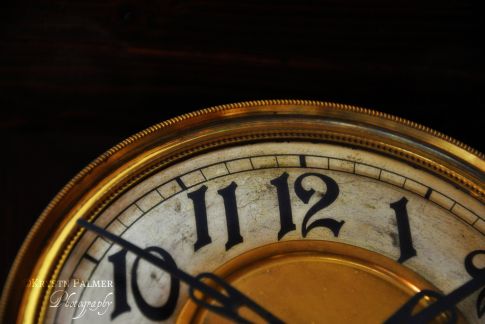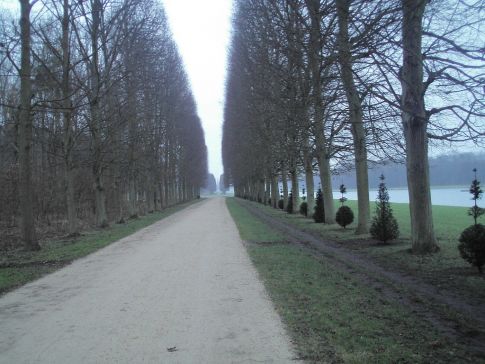It's Halloween. The nights are lengthening, the shadows deepening (if you're reading this in North America, anyway). The air has a chill sharpness, at once apple-sweet and faintly frightful, with that first, tentative hint of winter. Perfect time for a tall tale.
Make no mistake, what follows isn't science. I don't claim that it's true, or even plausible . . . though it might just be conceivable, quite a different thing.
But, even if not, speculative fictions need not be without a place on the scientific thinker's internal bookshelf, if only because such scenarios stimulate our sense of wonder and fascination about the many surprises nature still keeps behind the curtain--and of that, there can be no doubt.
So grab a mug of cider, or a few of those miniature Snickers bars resting at the bottom of the candy bowl. Lights down. Everybody hush.
Ready?

August, 1901. Three years to go before a young patent examiner named Einstein will submit papers to *Annalen der Physik* on the photoelectric effect, Brownian Motion, and something he calls "Special Relativity." Two years since Sigmund Freud has released his pioneering work *The Interpretation of Dreams.*
In late summer, Charlotte Anne Moberly, the Principal of St. Hugh's College, Oxford, takes a train to Versailles with her assistant Eleanor Jourdain (sister of mathematician Phillip Jourdain, in correspondence with Cantor and Frege, and himself working on logical paradoxes). These two genteel academics are planning to tour the Palace--which they do, and, finding it rather pedestrian as palaces go, decide instead on a leisurely stroll through the gardens. They are headed for a classic French chateau that still stands nearby. Becoming lost in the gardens en route, however, they begin to improvise, taking a short-cut down a smallish lane, crossing a bridge, quite unaware that they have already passed their intended destination.
Yet something stranger than a confusion over their location in space soon overtakes them. They also become confused as to their location in time . . . so much so that, according to enthusiasts of what is now called the "Moberly-Jourdain Incident," the two women experience a "time-slip"-- stepping directly into the past, by over a century.
Not that M/J understood what was happening all at once. Rather, at first they experienced only a disorienting sense of unreality, as if wandering in a dream. People around them became oddly few, and those who remained were wearing antique clothing. There were small cottages here and there; a weathered farmhouse with a plough out front. Stranger still, everyone seemed to be disturbingly static--including a little girl reaching out for a jug, held in her mother's hands, forever. Even plant life appeared, somehow, frozen in time. "Everything suddenly looked unnatural," Moberly would later write, "therefore unpleasant; even the trees seemed to become flat and lifeless, like wood worked in tapestry. There were no effects of light and shade, and no wind stirred the trees."
Some things did move, however, in this bizarrely liminal place--such as the two men they eventually spoke to, whom Moberly described as "very dignified officials, dressed in long greyish green coats with small three-cornered hats." Or that rude fellow wearing a cloak, with his smallpox-scarred face . . . or that woman sketching on the grass over there, who looks so curiously like Marie Antionette . . .

Finding their way out of this haze, M/J re-entered the world of mundane modernity (of the 1901 variety, anyway) and left Versailles with no more than the giggling suspicion that perhaps the gardens were haunted. Becoming more and more curious as to what they had actually experienced, however, they returned in time (ha ha) to Versailles, only to find their walking path gone, the tourist gardens predictably crowded, and no sign of any bad-skinned people in out-of-date clothing. Finally, in 1911 the two published an anonymous account, titled "An Adventure," which became the season's runaway sensation. Marie Antoinette seen in modern-day Paris! It has remained popular, at least among occult types, to this day--not by virtue of the ho-hum explanation (ghosts), but by dint of the suggestion that what these women experienced was a "temporal anomaly": some kind of brief flaw in time itself, into which they were swept . . .
Okay, lights up.
Alas, it's only a fable: a bit more digging into the Moberly-Jourdain Incident finds all the holes (and not spacetime ones). Most interesting from a psychological perspective, "An Adventure" may be a classic case of what modern psychologists call folie à deux--the "Barney and Betty Hill" phenomenon, where two emotionally close people (yes, what you're thinking has been suggested about Moberly and Jourdain) become entwined in each other's fantasy life, creating between them a self-reinforcing delusion.
But the notion of a "time-slip" is still a fascinating one. In my own personal time-tripping, I recall seeing a made-for-T.V. adaptation of "An Adventure" back in the 80's, called "Mrs. Morrison's Ghosts," the concluding sequence to which haunts me, pleasantly, to this day.
So around Halloween, I like to ask friends in the physics community how a time-slip such as the one described in the MJI could conceivably occur. At this moment in the evolution of our understanding, we have plausible speculation on ways by which one's relative past might be revisited: Einstein-Rosen Bridges; information encoded somehow in superluminal tachyons; looping around a cosmic string; and so on. FQXi people are hot on the trail of such exotica, as recent postings show. Some cosmologists feel the paradoxes involved militate strongly against such possibilities, though it's notable that GR doesn't rule them out. In the meantime, without even a theory of quantum gravity, we would be rash to put time-travel into the make-believe category altogether.
Those experiences, though--if they are ever had--will be nothing remotely like "An Adventure." Nothing I am aware of would allow for unintentional, survivable (!), self-correcting "mishaps" in the light cone of so subtle, and personal, a nature (perhaps you have ideas to share).
Yet the speculating mind is drawn down this shadowy byway. The notion is just eerie enough to linger. Perhaps this Halloween, stepping outside just after midnight to blow out the jack-o-lantern at the end of the walk, as the mists of early morning crowd your ankles, you too will walk accidentally off . . . to some-when . . .
